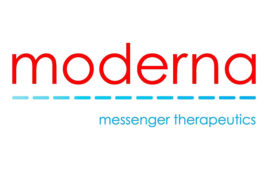
Pfizer-BioNTech vaccine image courtesy of Wikipedia
Signs are growing that COVID-19 vaccine boosters will be required to fight waning immunity and SARS-CoV-2 variants.
An article recently published in NEJM describes how SARS-CoV-2 variants managed to cause breakthrough infection in two patients fully immunized with mRNA vaccines. The 15 authors support “efforts to advance a new vaccine booster (as well as a pan-coronavirus vaccine) to provide increased protection against variants.”
While such breakthrough infections remain rare, they may grow more common as immunity from vaccines wanes. Data suggests that mRNA vaccines offer strong protection for at least six months. It is likely that immunity will wane sometime in another six to 12 months.
Pfizer CEO Dr. Albert Bourla has said that boosters of the vaccine will likely be necessary, as did BioNTech cofounders Dr. Ugur Sahin and Dr. Özlem Türeci.
The U.K. has already purchased 60 million additional doses of vaccine from Pfizer (NYSE:PFE) and BioNTech (NSDQ:BNTX) for use as boosters later this year.
And Chinese vaccine makers Sinovac and Sinopharm are exploring the potential of a booster vaccine and the possibility of sequential immunization. That is, using multiple vaccines to optimize efficacy.
The White House has said it is preparing for the use of boosters between nine to 12 months after full vaccination.
Data aren’t yet available, however, to make a case for when boosters should be administered. The duration of immunity may vary according to vaccine type. Adenovirus-vector vaccines themselves are potentially ill-suited for repeated use as boosters, given their potential to cause immunity to the vector.
Another factor is the continued spread of COVID-19 infections in many parts of the world, which could drive further viral mutations that threaten vaccinated immunity over time. Such mutations would underscore the need for boosters customized to emerging variants.
Companies like Pfizer and Moderna are also testing the potential of their original COVID-19 vaccines for use as boosters. Pfizer is testing administering a third dose of its vaccine six to 12 months after recipients received the second dose.
Both companies are also making a booster optimized against the B.1.351 variant, commonly referred to as the “South African variant.”




Tell Us What You Think!